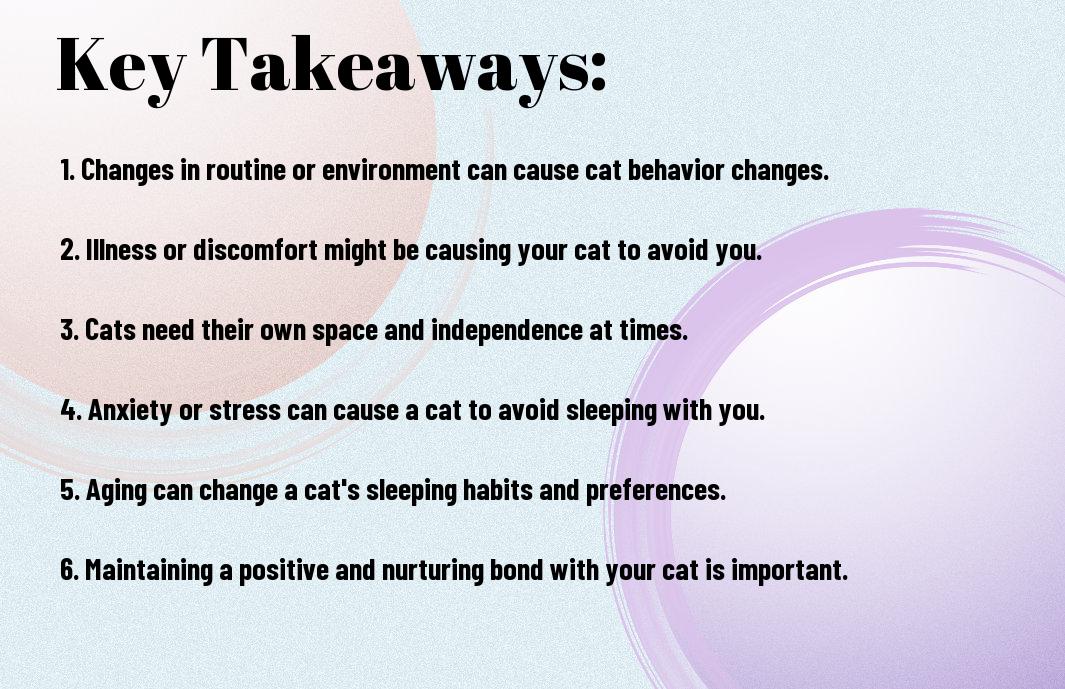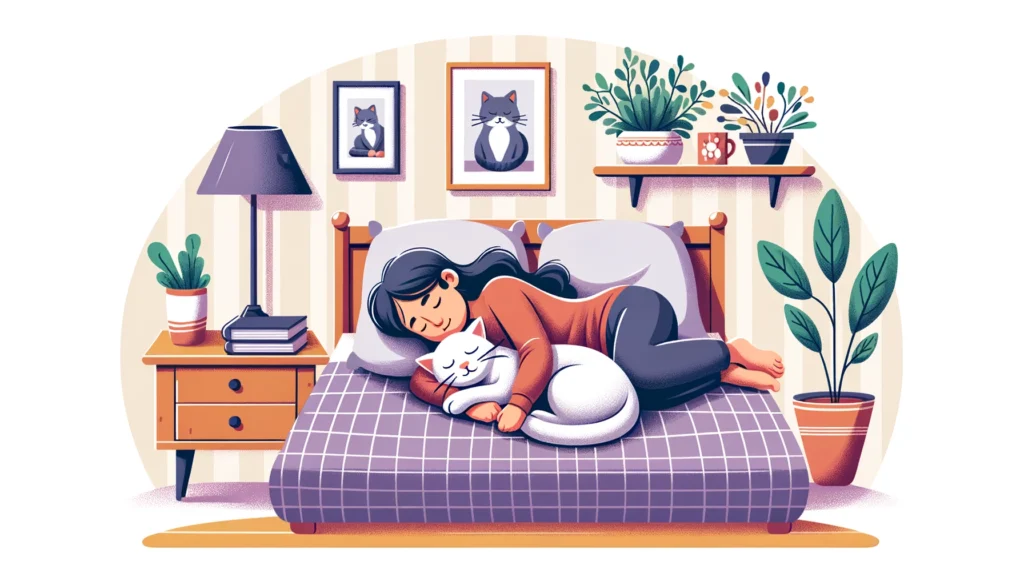Have you noticed a sudden shift in your feline friend’s sleeping habits? It can be worrisome when your cat stops sleeping with you, especially if they used to be a constant sleeping companion. There are various reasons why your cat may have stopped sleeping with you, and it’s important to understand these potential causes in order to address any underlying issues. From health concerns to environmental changes, there are key factors to consider when evaluating your cat’s sleeping habits . In this blog post, we’ll delve into the possible reasons why your cat has stopped sleeping with you and provide insights on how to encourage them to return to their favorite sleeping spot.

Is Keeping My Cat Off the Bed Causing It to Stop Sleeping with Me?
If you’re wondering whether keeping your cat off the bed will stop it from sleeping with you, there are tips for keeping cat off bed. Providing your cat with a comfortable alternative sleeping spot can help redirect its behavior. You can also use deterrents like double-sided tape or aluminum foil to discourage it from jumping on the bed.
Natural Changes in Feline Behavior
Some cat behaviors, such as sleeping habits, can change over time due to natural factors. If you’ve noticed a change in your cat’s sleeping patterns, it may not necessarily be because of something you’ve done. Cats, like humans, go through changes in their behaviors and preferences as they age, and it’s important to understand these changes to better accommodate your feline friend. Here are a few reasons why your cat may have stopped sleeping with you at night.
Age-Related Changes
As your cat gets older, you may notice changes in their behavior, including their sleeping patterns. Older cats tend to become more independent and may prefer to sleep alone rather than with their human companions. This change is natural and does not necessarily mean that your cat no longer loves you. In fact, your cat may simply be seeking a quiet, comfortable space to rest undisturbed. Make sure your cat has a cozy bed of their own where they can sleep peacefully, and offer them plenty of affection during the day to reassure them of your love and bond.
Seasonal Influences
Seasonal changes can also impact your cat’s sleeping habits. During the warmer months, cats may prefer to sleep in cooler areas of the house, such as tiled floors or in shaded spots. Conversely, in the colder months, they may seek out warmer places to sleep, which may not always coincide with your bed. Additionally, changes in daylight hours can affect your cat’s internal body clock, leading them to adjust their sleeping patterns accordingly. Understanding and accommodating these seasonal influences can help you better understand and support your cat’s natural behaviors.
Environmental and Social Factors

While physical health issues are a common reason why your cat may have stopped sleeping with you, there are also environmental and social factors that could be affecting their behavior. Here are some things you should consider:
- Stressful situations in the home, such as a new pet, a new baby, or a change in routine, can cause your cat to feel anxious and less likely to seek out your company.
- Conflict with other pets in the household can lead to your cat feeling threatened and choosing to avoid sleeping in the same space as you.
- Your cat’s age and stage of life may also play a role. As cats get older, they may become more independent and less inclined to cuddle up with you at night.
- Changes in your work schedule or other commitments could impact the amount of time you are able to spend with your cat, leading them to seek out alternative sleeping arrangements.
The reasons why your cat may have stopped sleeping with you are complex and multifaceted, and it’s important to consider all of these factors when trying to understand their behavior.
Changes in the Home Environment
If you’ve recently made significant changes to your home environment, such as moving to a new house, redecorating, or introducing new furniture, this could be causing your cat to feel unsettled. Cats are creatures of habit and can be sensitive to changes in their surroundings. It’s important to provide your cat with a safe and comfortable space within your home where they can retreat and feel secure. You may also want to consider using pheromone diffusers or other calming products to help your cat adjust to any changes in the environment.
FAQ
Why did my cat stop sleeping with me?
There are several reasons why your cat may have stopped sleeping with you. It could be due to changes in their environment, discomfort, illness, or simply a change in their routine. Cats are known to be creatures of habit, so any disruption in their routine can lead to changes in behavior, including where they choose to sleep.
How can I encourage my cat to sleep with me again?
If you want to encourage your cat to sleep with you again, it’s important to create a comfortable and inviting space for them. Provide a cozy bed or blanket in a quiet, warm, and safe spot where your cat feels secure. Spend quality time bonding with your cat, and establish a predictable routine to help them feel at ease. Avoid forcing or pressuring your cat to sleep with you, as this can cause stress and further distancing.
When should I be concerned about my cat’s change in sleeping habits?
If your cat’s change in sleeping habits is accompanied by other concerning symptoms, such as decreased appetite, excessive hiding, lethargy, or behavior changes, it’s important to consult with a veterinarian. These changes could indicate an underlying health issue that needs to be addressed. Regular wellness check-ups and open communication with your veterinarian can help ensure your cat’s overall well-being.

Hello there, I am Iftekhar Ahmed. I am the owner of Mishka & The Cat Corners. I love to explore and write on various topics about cats

